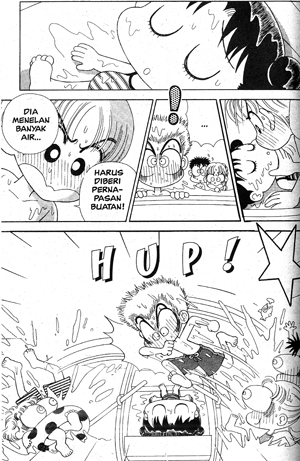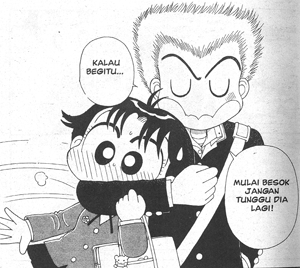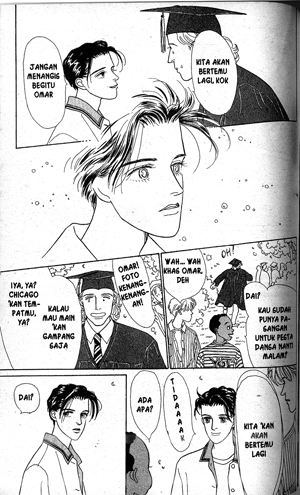Kocchimuite Miiko | Sabbath Cafe
This week titles are recommendations from a reader (Sabbath Cafe) and a friend (Kocchimuite Miiko!). I usually don’t give a grade to my reviews, but let’s make some exception for this time. Both scored A, if you can grab one, buy it. As always, this reviews contains spoiler. And thank you Julie for proofreading.
Kocchimuite Miiko!

I would have never thought of reading Kocchimuite Miiko (KM), if it wasn’t for a friend that recommended it. It has all the attributes of what a great manga should be, that even an adult reader couldn’t stop to put it down.
YAMADA Miiko, our main character, is a 5th-grader. Her best friends are SHIMURA Mari and OGAWA Yuuko (Yukko). Yukko’s boyfriend is SATOU Kenta, SATOU is friends with EGUCHI Tappei, a boy who called Miiko, shortie. YOSHIDA Ikuya is another boy that likes Miiko. :D
Miiko has a brother named Mamoru. Her mother works as a manga editor for Ocia (this is a pun from Ciao, the magazine where KM is being serialized) and her father is a salaryman. Since both parents work, Miiko and Mamoru share responsibilities with their house chores. But usually, Mamoru will take the responsibility to do more chores since Miiko is the typical laid back older sister. Despite that, throughout the book, you will see that Miiko loves her family so much.
Miiko’s story life revolves around the school and their two-bedroom house. At school, she is the constant target of being verbally-bullied by Tappei. It is funny to read and laugh at how Miiko and Tappei’s relationship is going. Obviously they enjoy each other’s company (though undeclared like Yukko-and-Kenta’s), but like any other school grader (and perhaps adults who read this, too) they had fights and quarrel very often. *smile* Meanwhile at home, their bedroom is the subject of a constant debate between Mamoru and Miiko. Both share the same room, however, Miiko doesn't share her roommate's frustration over being clean or tidy. XDDD
Meanwhile, as the story developes further, Tappei is easily annoyed and insecure whenever Miiko hangs out with YOSHIDA. He often interrupts the time that Miiko is alone with YOSHIDA and ends up making Miiko angry for being a pest. Some people suggest to Miiko that Tappei is rude to her, but she would deny it.
True, from our point of view, what Tappei is doing to Miiko can be considered rude, but he also-like Miiko said-has his own good attributes. Once he takes the responsibility and apologizes to their homeroom teacher when a vase was broken. It was actually Miiko who shattered it. And when Miiko forget her underwear and her house keys at the same time, it was Tappei who saved her from further embarrassment.
This manga also talks about friendship and family. Miiko and Mari have many differences, but Yukko is always there to make them think clearly. That doesn’t mean they are really dependant on Yukko, there’s always time when Yukko is confused and can not make up any decision and her two best friends help her. Uniquely enough, the stories portrayed show awareness about these issues: pet, people with bad intentions to children, the joy of giving, respect, and countless messages. I recommend this series to anyone who enjoys the values of life and friends, young or old.
The original series was titled ‘Miiko Desu’ (MD) and was in another magazine called Pyong-pyong (Boink-boink), which has been discontinued. At MD, Miiko is a 4th grader, and YOSHIDA doesn’t show up that often. MD is published in Indonesia with the title ‘Namaku Miiko’ (My name is Miiko!) currently at volume 4. Meanwhile KM is titled, ‘Hai Miiko!’ (Hi, Miiko!) and had reached volume 17 last week in Indonesia. There are also some spin-off titles like ‘Best of Miiko’ (latest here is vol. 3) and ‘Miiko in Edo Period’. All are great collections.
And as a plus: this manga won the Shogakukan Award in 1996 in Children's category. The drawing maybe cute and simple, but the story runs deep into our heart.


Miiko has drowned and needed CPR, YOSHIDA
tried to help, but Tappei panicked!
Miiko in the future, here Tappei is saying:
"Then don't hang out with him anymore!"
referring to YOSHIDA.
Sabbath Cafe

Sabbath Cafe is one of the best series I have ever read. This series was published in Indonesia a decade ago (thus, why the cover scan looks so bad!); however the issues are still relevant to anyone who is of age.
YONOGI Dai, age 13, returns to Japan and starts going to St. George International School. He lived in Chicago previously. Coming to Japan is his personal soul-seeking adventure, to find meaning to his existence. Sounds too hard to read? Read along.
His fellow students (Jerry, Marty, Omar, Jeany) at St. George had a difficult time making friends with Dai, because he’s such a loner and his not-my-business attitude. But, they persist to talk to him and started to get along. One day his friends insisted on visiting him at his house to see his parents. Everything went smoothly until one day when Dai was sick, Jerry and Marty pay a surprise visit and find out that his parents aren't there!
It turns out that his mother and his guardian had passed away in Chicago and all this time he was living in Japan alone, and the couple they saw previously were actors. Jerry and the others are very worried about his financial needs, thus they try so hard not to let Dai spend a dime! But at a potluck party at Dai’s house, they found out that he’s the creator of a best-selling computer game! Everyone then stares at the multi-millionaire in front of them. And Sioux (Jerry’s sister) breaks the ice by giving Dai her last year’s Halloween candies.
Slowly but surely, Dai opens his heart for a closer relationship with his friends; he learns what Marty’s true dream is and why Jerry has a long hair. His friends also learn many things about Dai; like how he has a photographic memory and why he never been to a school before. Dai also does a lot of self-reflection about his past, present, and future in the series. This is represented with simple character drawings yet powerful backgrounds.
Thanks to some fangirls from the nearby Japan school, one of Dai's relatives tries to contact him via a letter. Eager to find out about his family, he works with a detective to trace the letter. Unfortunately he finds out that his only living relative is a grandmother who hates him to the core. How will he mend his relationship with his grandmother when he does not know anything about his dark past? And when he learns the truth, will it be possible?
This is a must read for those who still searching for our existence. I know I still do.

"Of course we will meet again, Omar!", what a powerful line.
As a side note: The Indonesian edition of Sabbath Cafe has cover jackets. It was one of the last series packaged that way. Elex (the publisher of this manga in Indonesia) had to cut down cost after the economy crisis hit Asia in 1998 and eliminated this special attributes from manga to keep the cover price affordable.